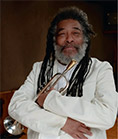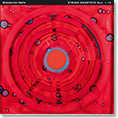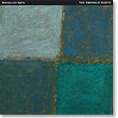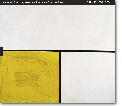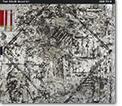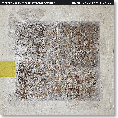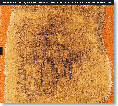TRIOT WITH JOHN TCHICAI
The story of Triot began in Copenhagen in the autumn of 1998 when the Finnish saxophonist Mikko Innanen, who at that time was living in the Danish capital, met the two Danes in the band, bassist Nicolai Munch-Hansen and drummer Stefan Pasborg. They gave their very first concert together as a trio in Poitiers, France, in April 1999 and have since performed all over Europe, including Belgium, Denmark, Estonia, Finland, Spain and Sweden.
The name of the group represents the combination of the words "trio" and "riot" and is quite descriptive of not only the size but the attitude of this particular threesome. They do not wish to be tied down by convention and can, at times, be quite riotous in their music. At the same time, the music of Triot can also be seen as an amalgamation of the introverted and sometimes melancholy Finnish character (although Mikko Innanen is hardly its most typical representative) and the more extroverted and fun-loving Danish personality with shared interest in the Afro-American musical tradition as an additional, unifying element.
Mikko Innanen says the following of the collaboration between Triot and John Tchicai and the music that resulted from it:
"The feeling of the blues. Isn´t that the one ingredient in music that is found all around the world, in all soulful, serious and sincere music? You may not always want to call it the blues, though. Still, what other word could be more fitting to describe the very feeling that can´t quite be described? I´m not talking about the style of music often called "the blues". Many a "blues" artist I have heard doesn´t have the blues at all - not to mention the "soul" artist with no soul or the "swing" musician who doesn't!
Listening to the music we played together in May 2002, I feel that one thing that the four of us - two Danes, one Finn and one Afro-Danish-American - have in common musically, whether we like to admit it or not, is the feeling of the blues. For me, that is something that keeps it all together.
Paul Desmond once compared listening to the music of Ornette Coleman to "living in a house where everything is painted red". Be that as it may, living all the time in a house where everything is painted blue could certainly be a little tough. That is why you need some periodic "Sudden Happiness" to get the blues mixed up with the yellows and the reds in all their marvelous shades. Just for balance."
Although the members of Triot mostly prefer playing their own original compositions, music by such a versatile group of composers as Ornette Coleman, Johnny Dyani, Duke Ellington, Antonio Carlos Jobim, Charles Mingus, Tete Montoliu, John Tchicai, Victor Young and even Harry Belafonte has been featured in their repertoire. Sometimes playing totally free, sometimes within a tonal framework and sometimes "strictly" in a song form, they mix the pluralistic sounds and visions of the 21st century with the more earthy sounds and rhythms of the jazz tradition.
Triot has often featured guests with the basic group; these have typically come from among their own contemporaries. However, in May 2001, when the members of Triot were planning a Danish-Swedish tour for May 2002, Stefan Pasborg proposed saxophonist John Tchicai as a featured guest for the trio, having played with him already in 1997 in San Francisco and again in 1998 at the Copenhagen Jazz Festival (incidentally, with Mikko Innanen in the audience although still an unknown to both Pasborg and Tchicai). The last three of the five concerts on this tour were recorded and the results can be heard on this CD.
With Tchicai, Triot had a collaborator who not only shared their fondness for experimental jazz but represented a virtual personification of it. Although Tchicai only had spent a scant four years living in New York in the early 1960s, he had managed to hit the very peak years of New York´s new wave in jazz - a period that may, in fact, never be surpassed in its ground-breaking creativity. The young Afro-Dane found himself in the thick of it - creating some of the freshest music of the day side by side with many of the music´s greatest masters (Don Cherry, John Coltrane, Roswell Rudd, Archie Shepp, Cecil Taylor and many, many others) and participating in a number of recording sessions that have withstood the test of time and have, indeed, been confirmed as belonging to the true masterpieces of this unique period.
With such a resume (and this was only the beginning) and more than forty years of music making behind him, Tchicai could well be expected to rest on his laurels but this could not be further from the truth. As so often in the past with others, he approached his collaboration with Triot with an open mind and genuine interest in the contributions of his younger colleagues who, in an interesting parallel, are now more or less of the same age as Tchicai was during those exciting years of the early 1960s in New York.
The four musicians easily found a common ground and enjoyed their week of touring together. While the members of Triot might have tempered their own approach somewhat to make room for their guest and certainly were required to keep their ears open in order to be able to follow his often unexpected turns within the music, the latter reciprocated by sharing his own insights and experiences. We can consider ourselves lucky to have this recording as a document of their collaboration. Clearly, a good time was had by all. Through this recording, we can all get our own dose of "Sudden Happiness".

